Can Sharks rise from 0-2 to win Cup? Here's how five teams did it

Your teams on the go or at home. Personalize SI with our new App. Install on iOS (iOS or Android)
The San Jose Sharks find themselves in a tough spot.
After dropping the first two games of the Stanley Cup Final to the Pittsburgh Penguins, they're heading home needing to win four of the next five.
That's a tall order. Just five teams in NHL history have rebounded from an 0-2 deficit to win the Cup. Five. Out of 49. That's not many ... but it gives the Sharks at least five reasons to believe they can be the next team to reverse their early misfortunes.
And they don't have to dig too far into the past to see how it was done.
The Boston Bruins captured the 2011 Stanley Cup after dropping the first two games to the Canucks in Vancouver. And there are definite parallels between the two series.
In the opener, a late goal by Raffi Torres was the difference in a 1–0 Vancouver victory. Game 2 went to an extra period before Alexandre Burrows buried the Bruins with the second fastest OT goal ever scored.
But it wasn't just the results that were similar. Those Bruins struggled in many of the same ways as these Sharks. They couldn't get their forecheck going. They were badly outskated and were routinely beaten to pucks. And when they finally did get the puck on their stick, they handled it like it was square.
Here's how they, and the other teams that dug themselves an 0-2 hole, managed to turn it around:
2011 Boston Bruins
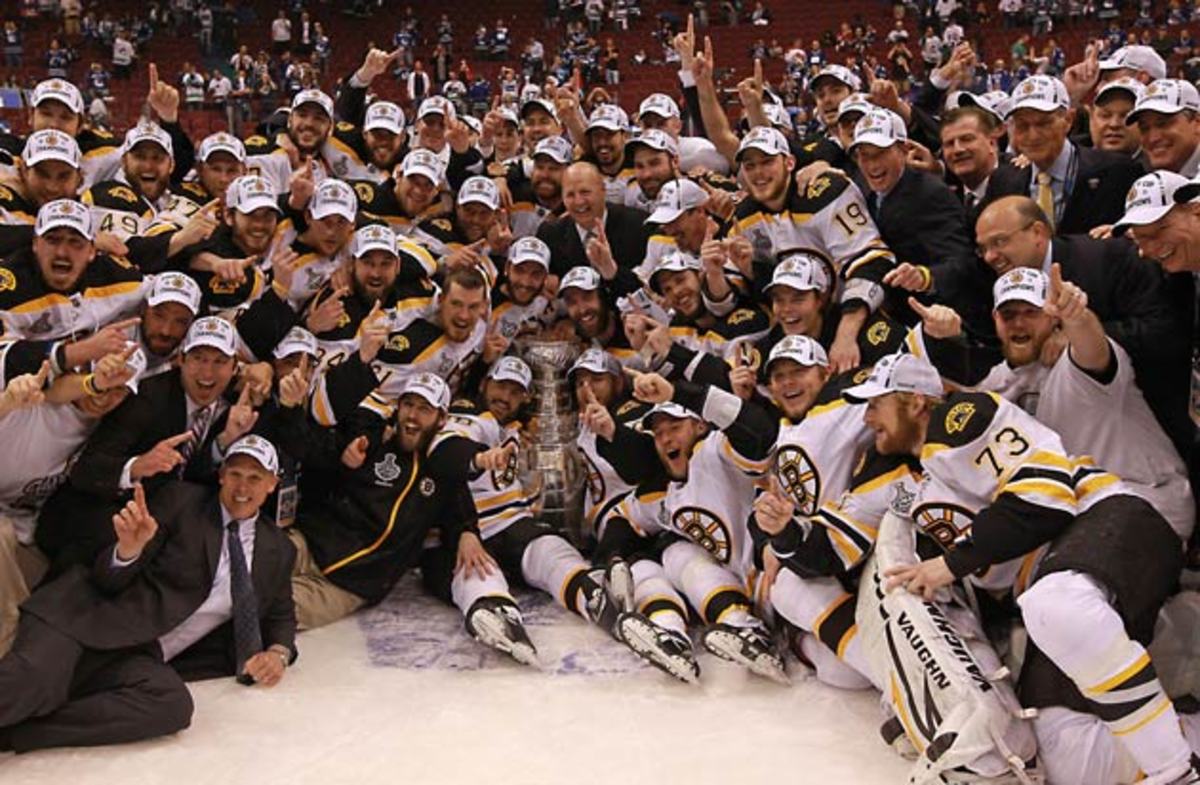
• SI Vault: True Grit to the End in Boston (6/20/2011)
Series synopsis: After dropping the first two games in Vancouver, the B's rediscovered their legs back in Boston. They took the Canucks out behind the woodshed in Game 3, beating them 8–1, then dropped a precision 4–0 bomb on them in Game 4. Roberto Luongo of the Canucks shut the door in Game 5, recording his second 1–0 whitewashing of the series. He joined Frank McCool (1946) as the only netminders in NHL history to turn that trick in the Final. The B's scored four goals in a span of 4:14 in the first period of Game 6, breaking the record for the quickest four tallies by one team in a Cup Final. They went on to win 5–2, setting the stage for Game 7 in Vancouver. There the B's got two goals apiece from Brad Marchand and Patrice Bergeron on the way to a 4–0 victory.
Turning point: By most accounts, it was the Aaron Rome head shot on Boston's Nathan Horton just 5:07 into the first period of Game 3 that galvanized the Bruins. Horton, who'd been a vital part of Boston's attack through the first three rounds, was seriously concussed and would not return in the series.
“They really rallied around that," said general manager Peter Chiarelli. “Horts had a terrific playoffs, too. He’s such a valuable contributor to the team. These guys, they can rally around anything. That probably was the turning point. But that’s the magic of this bunch."
No doubt that steeled the resolve of the Bruins. But that overlooks the bold and decisive touch of coach Claude Julien and his staff, who recognized the need for a greater physical response ahead of Game 3 and scratched Tyler Seguin in favor of gritty fourth liner Sean Thornton. It's a move that seems unthinkable now, but it paid immediate dividends. The Merlot Line (Thornton with Daniel Paille and Gregory Campbell) combined for six shots and 11 hits, setting the tone for the game and the remainder of the series.
Hero: Tim Thomas capped off a sensational season by becoming the oldest player ever to capture the Conn Smythe Trophy. The 37-year-old keeper set an NHL record for most saves in a Stanley Cup Final (238) and became the first goalie to post a shutout on the road in Game 7 of the final. Fittingly, he made 37 saves in that 4–0 clincher in Vancouver.
2009 Pittsburgh Penguins
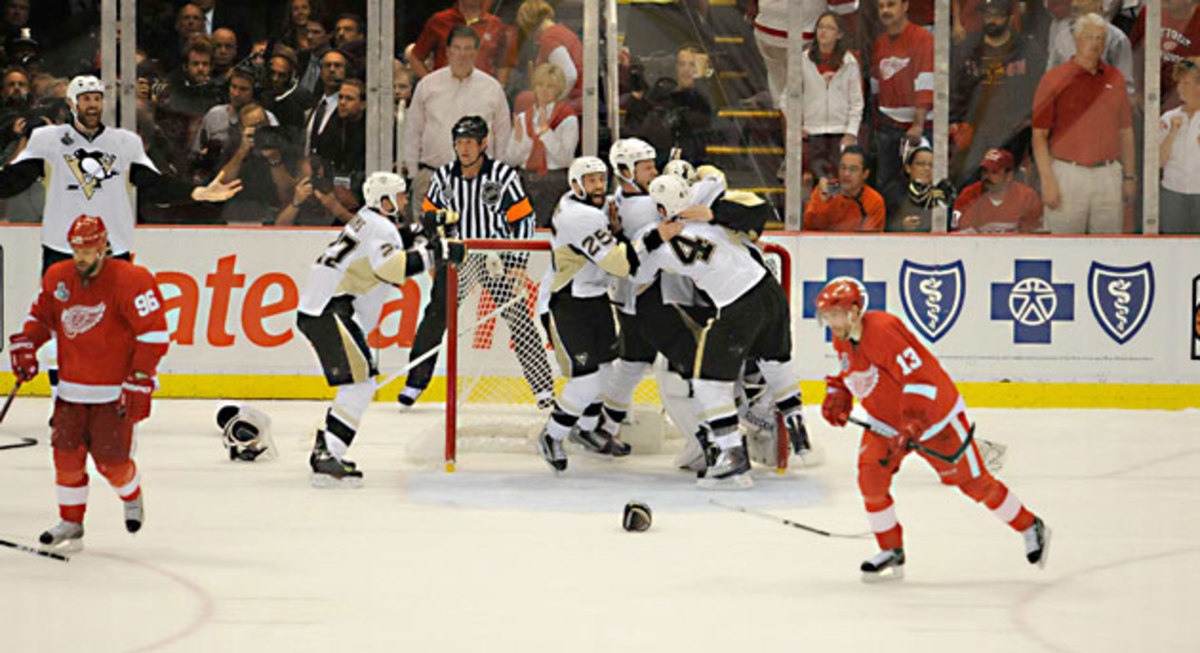
• SI Vault: Pens are Mightier (by Michael Farber; 6/22/09)
Series synopsis: It didn't take long for the rematch of the 2008 Final—won in six games by the Red Wings—to swing Detroit's way. They cadged a 3–1 Game 1 victory off of three had-to-see-'em bounces, then dominated much of Game 2 before winning by the same score.
The Pens evened the series with a pair of 4–2 wins at home, but the return of Pavel Datsyuk off IR in a penalty-filled Game 5 sparked the Red Wings to a 5–0 blowout. With the two-way marvel back in the lineup, it appeared as though the series had shifted in Detroit's favor, but the Pens sent it the distance with a hard-fought 2–1 win in Game 6.
That set up one of the most thrilling final games in recent memory. Max Talbot struck twice to stake the Pens to a 2–0 lead midway through the game, but the Pens had to survive a frantic third period without the help of Sidney Crosby. The captain injured his knee on a second-period hit by Johan Franzen and was forced to watch the rest of the contest, outside of a single 32-second shift, as the Wings staged a furious attempt to defend their title, a scenario he found agonizing.
"I don't recommend it," said Crosby, who at 21 became the youngest captain in NHL history to win a Stanley Cup. "It was so painful. I mean, being a captain and seeing what the guys are doing out there blocking shots. Seeing how intense it was, it was even more painful to see it go like that."
Turning point: Game 3 was up for grabs with the score tied at two entering the third period. The Pens, limited to just 11 shots through 40 minutes, seized the moment. They landed the first six of the period and were in complete control when Matt Cooke drew an interference penalty on Detroit's Jonathan Ericsson at the 9:46 mark. Sergei Gonchar broke the tie with on the ensuing power play and then Pittsburgh's defense shut it down, holding Detroit to just two shots the rest of the way.
Hero: Evgeni Malkin won the Conn Smythe Trophy. Marc-André Fleury made the biggest save in franchise history, denying Nick Lidstrom with seconds remaining in Game 7. But Max Talbot hasn't paid for a drink in Pittsburgh since scoring both of his team's goals in the decisive 2–1 Game 7 victory. What's often forgotten is that he also accounted for two critical tallies in that pivotal Game 3. Talbot gave the Pens a 1–0 lead just 4:48 into the first then provided the empty netter in the final minute to seal the 4–2 win that got the Pens back into the series. Without those two goals, Pittsburgh likely gets swept.
1971 Montreal Canadiens
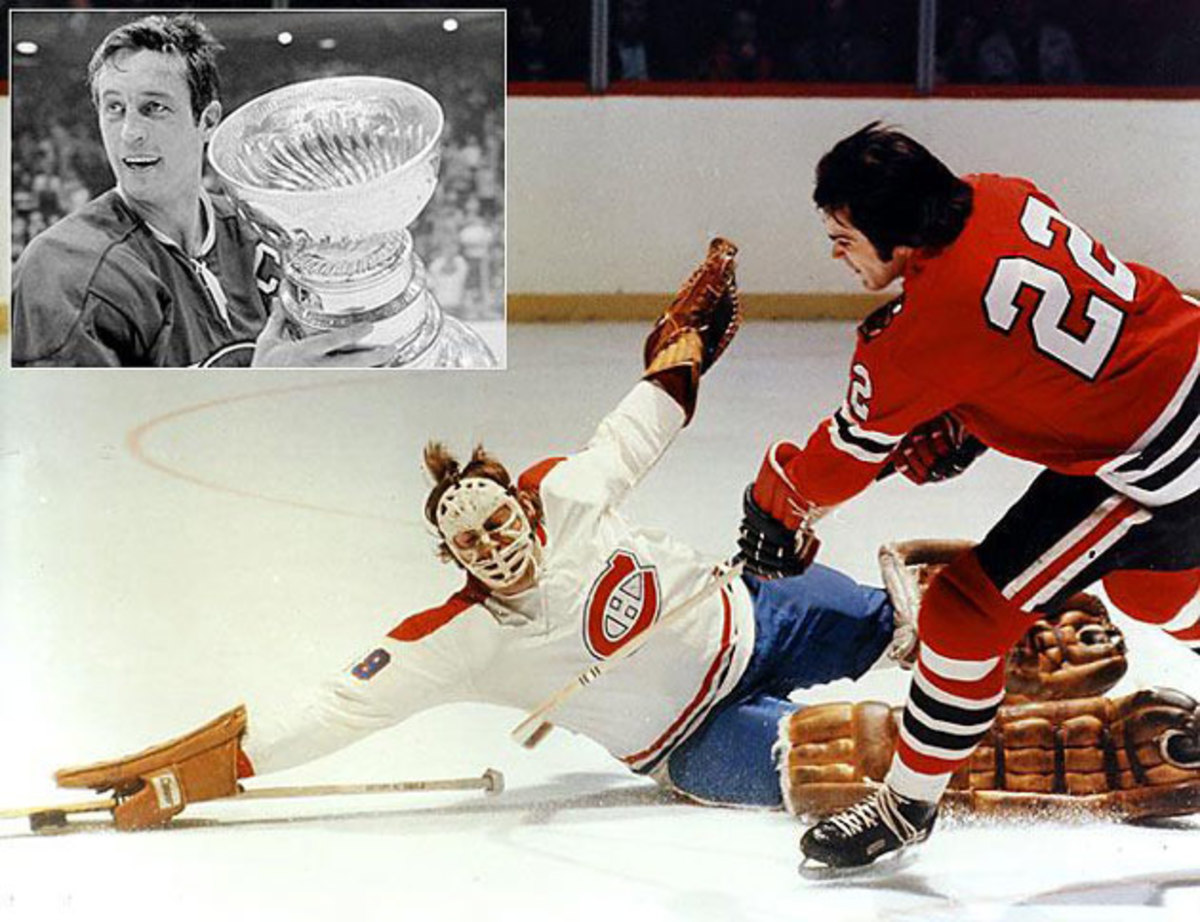
Series synopsis: A year before they teamed up to backstop Canada in the Summit Series, Montreal's Ken Dryden and Chicago's Tony Esposito squared off in an epic seven-game goaltending duel. Dryden made 56 saves in the opener, but Montreal dropped a 2–1 OT decision. The Hawks stretched their series lead to 2-0 with a 5–3 win in Game 2, before the Habs evened it up with a pair of victories at the Montreal Forum. Esposito pitched a 31-save shutout to lead Chicago to a 2–0 win in Game 5, but melted down in Game 6 as Montreal scored four times on just 16 shots in a 4–3 win. The Hawks got off to a blazing start in Game 7, building a 2–0 lead on goals by Dennis Hull and Danny O'Shea, but the Canadiens roared back, scoring three times in a span of just over eight minutes to seal their comeback victory.
Turning point: On the day of Game 7, beat writer John Robertson revealed in the Montreal Star that legendary captain Jean Béliveau would play his final game that evening. Hard to imagine the timing was coincidental.
Hero: Frank Mahovlich and Yvan Cournoyer were Montreal's most dangerous snipers in the series, notching five and four goals, respectively. But it was another veteran who came up big when it counted ... and he did it after stirring up a hornets nest earlier in the series.
Chicago shut out the Habs, 3–0, in Game 5 to take a 3-2 series lead. In the aftermath, veteran forward Henri Richard dropped a bomb, calling Al MacNeil "the worst coach [he had] ever played for." The comments turned into a language war in the local media, and led to several death threats against MacNeil, who required bodyguards on the bench for Montreal's 4–3 win at home.
Richard, who was unhappy with his ice time, made the most of it in Game 7. He knotted the score at two at 18:20 of the second period, then notched the series winner at 2:34 of the third. It clinched the 10th Stanley Cup of his career and sent Béliveau into retirement as a champion.
1966 Montreal Canadiens
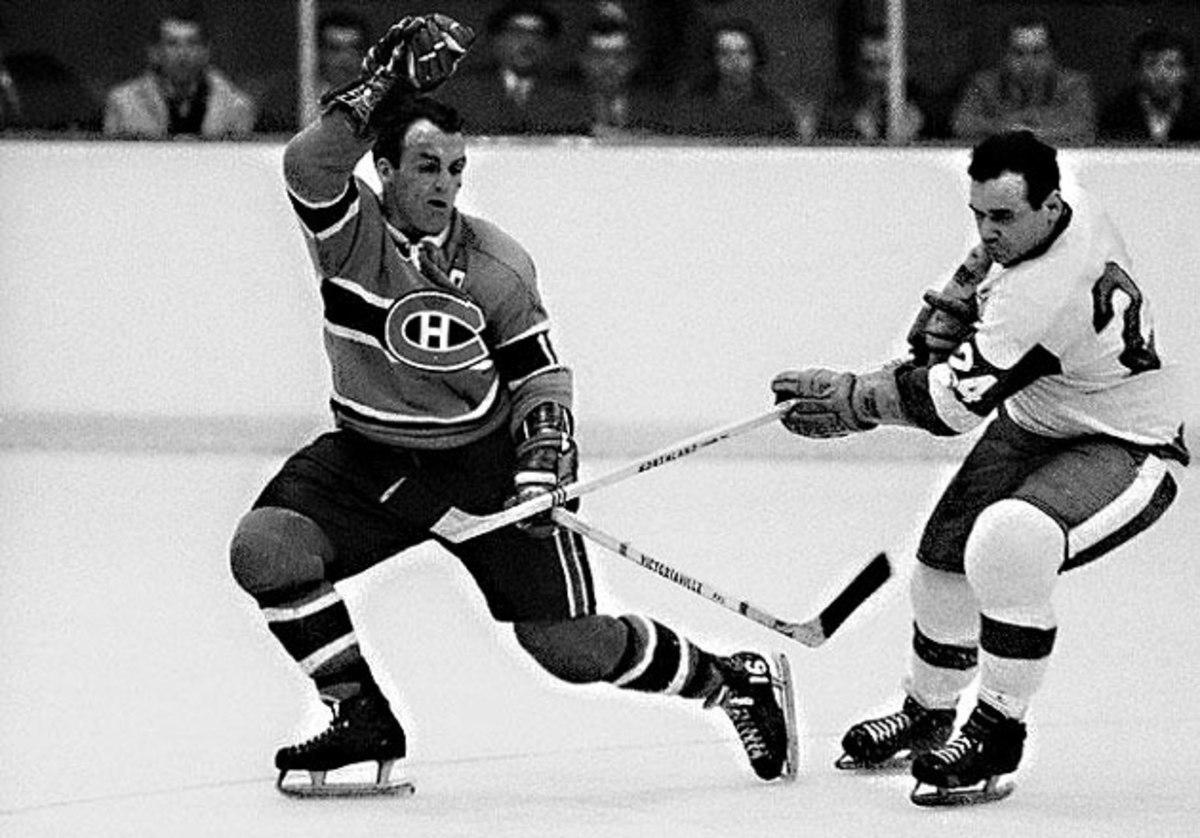
Series synopsis: The underdog Red Wings came out flying, winning Games 1 and 2 at the Montreal Forum to set up the possibility of a sweep back in the friendly confines of the Olympia. Gilles Tremblay spoiled the party with a pair of goals in a 4–2 win in Game 3, then Montreal's Ralph Backstrom provided the late winner in a 2–1 Game 4 victory.
A 5-1 Montreal blowout in Game 5 sent the series back to Detroit for the decisive sixth game. The Canadiens got out to an early 2–0 lead on goals by Béliveau and Leon Rochefort but the Wings roared back with tallies from Norm Ullman and Floyd Smith to send it to OT. Two minutes into the extra period, Henri Richard broke in but got tangled up with a Red Wings defender, sending both players sprawling to the ice. Somehow, the puck slid past Detroit netminder Roger Crozier, and though the Wings protested that it went in off Richard's hand, the goal stood, clinching Montreal's seventh Cup in a span of 11 seasons. With the win, Montreal became the only team to rebound from a 2-0 deficit to claim a final series in six games.
Turning point: Game 3 was up for grabs until Tremblay scored twice in a span of 1:36 early in the second period to break a 2–1 contest wide open. The second tally came on the power play, just 18 seconds after Bert Marshall went into the box. The Wings never recovered.
Hero: After allowing eight goals to the Wings in the first two games, goalie Gump Worsley tightened his belt and held Detroit to just six the rest of the way.
1942 Toronto Maple Leafs
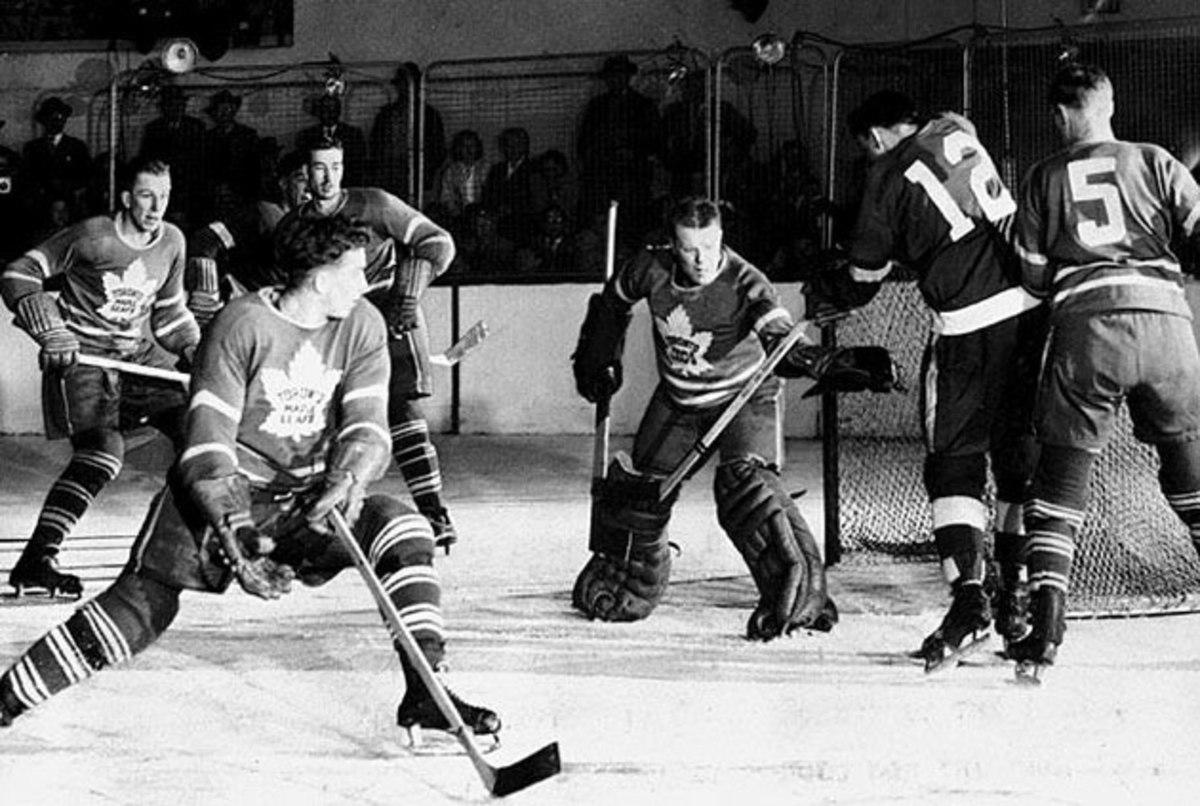
Series Synopsis: The Red Wings were unlikely participants in the final, having finished in fifth place during the regular season, 15 points back of the second place Leafs. But they snuck out of Toronto with a 3–2 win in the opener, then took the next two games by scores of 4–2 and 5–2 to build a seemingly insurmountable three games to none series lead.
"They're unbeatable," Toronto goaltender Turk Broda said the third loss. "They can't do nothing wrong!"
And then they did. The Wings held leads of 2–0 and 3–2 in Game 4 but couldn't seal the deal. Syl Apps and Nick Metz scored late to lead Toronto to a 4–3 win. Detroit coach Jack Adams compounded the failure by throwing punches at the referee post-game, earning an indefinite suspension. Don Metz scored a hat trick in Toronto's 9–3 win in Game 5, then Broda pitched a 3–0 shutout in Game 6, setting the stage for a winner-take-all Game 7.
The Wings carried a 1–0 lead into the third on a Syd Howe goal, but Sweeney Schriner scored twice, and Pete Langelle tallied the winner as the Leafs became the first team ever to overcome a 3-0 series deficit.
Turning point: It may have been the greatest coaching decision in NHL history. It was certainly the ballsiest. With the season on the line, Toronto coach Hap Day benched his leading scorer, Gordie Drillon, along with veterans Hank Goldup and Bucko McDonald for Game 4, inserting Gaye Stewart, Bob Goldham, Ernie Dickens and Don Metz in their place. The move shook up the team and changed the course of hockey history.
Hero: So many answered the call in this series, but give the nod to Don Metz. The seldom-used forward scored just twice in the regular season, but chipped in four goals and seven points in the final four games of the series to pace the Leafs to the most memorable championship in franchise history.
